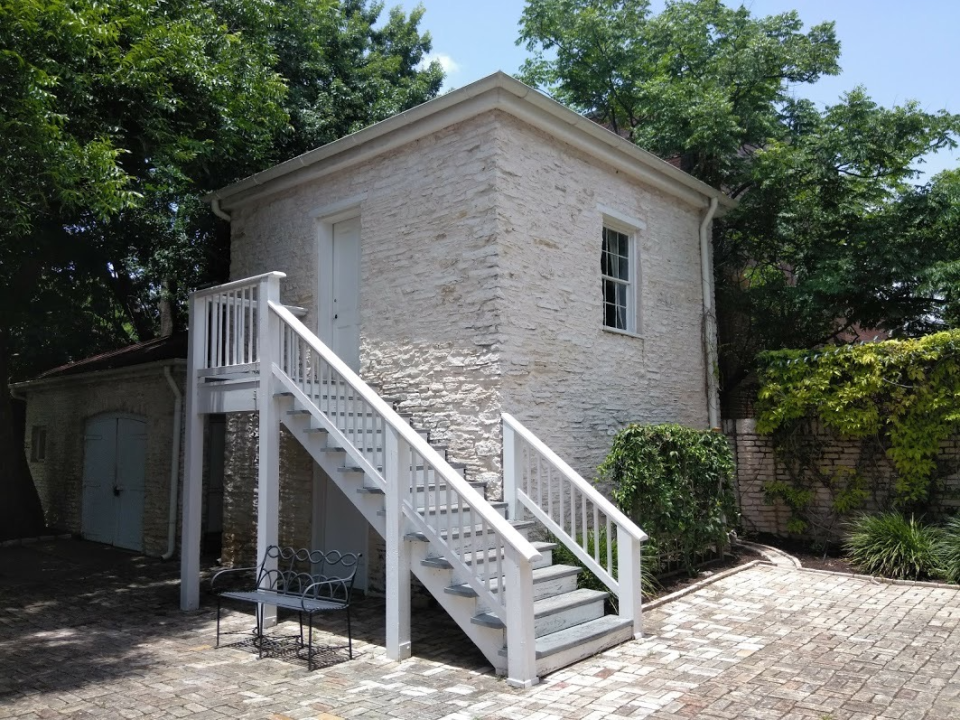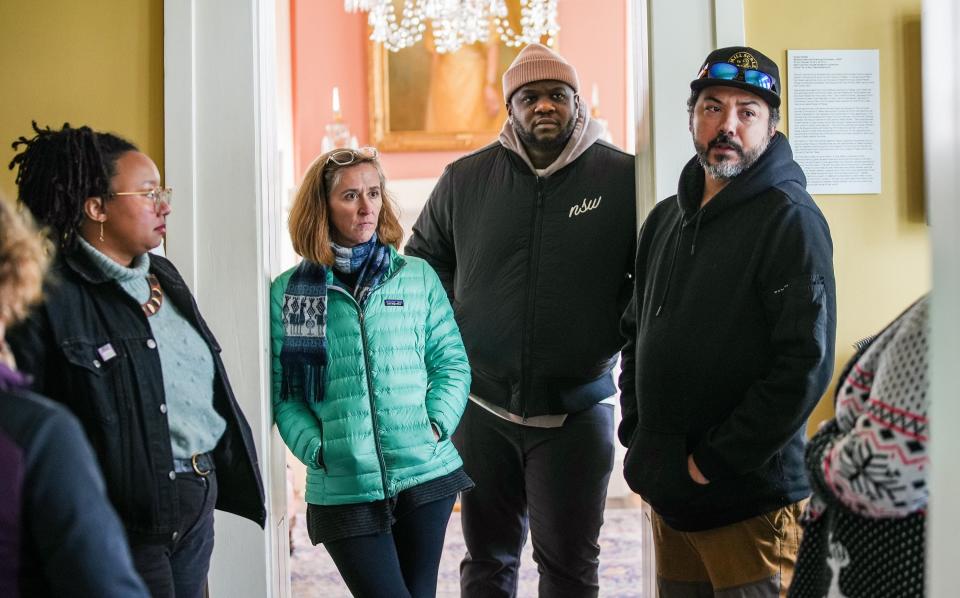Museum reckons with race in Austin while celebrating three exceptional Black chefs
A moment of contemplation led the Neill-Cochran House Museum's Rowena Dasch to unearth a key with the power to unlock both history and a new chapter.
The executive director of the museum was pondering in 2016 what day-to-day life looked like for the early inhabitants of the historic Greek revival home built in 1856 when she realized that there was no space designed for daily tasks like cooking and washing dishes.
That caused her to reconsider the existence of the cramped two-story building behind the main house. Given the date of the house’s construction, a time when enslaved people accounted for almost a third of Austin's population, Dasch ascertained that the back building must have been the living quarters and work area of enslaved people.
“It may sound crazy that this hadn’t ever occurred to any of us before. But so much of history is hiding in plain sight just waiting for you to ask the right question," Dasch told the American-Statesman recently.
The discovery prompted research, funded by the National Trust for Historic Preservation. Architectural history professor Dr. Tara Dudley, with the support of her students in the University of Texas School of Architecture, produced a Historic Furnishings Report. The research, along with census data and oral histories, helped the museum better understand the people who lived and worked in the area during the second half of the 19th century.
The historic repopulation and recontextualization of what the museum calls “the only intact and publicly accessible slave dwelling located within the boundaries of Austin's original townsite” broadened the narrative of the 61-year-old museum. It also inspired the creation, in spring 2022, of the museum's “Reckoning with the Past: The Untold Story of Race in Austin” project, which includes public programming and the restoration of the historic slave quarters.

The museum will host a fundraiser on March 4 for the Reckoning with the Past project, featuring conversation and cuisine with three notable Black Austin chefs — Damien Brockway of Distant Relatives, Tavel Bristol-Joseph of Canje and Amanda Turner of Olamaie — who have all taken unique paths to their positions as leaders in a town and industry that have little Black representation. The three chefs, along with Dasch, sat with the Statesman at a private residence in Central Austin ahead of the event to discuss their experiences cooking in the capital city and the new directions their careers have taken in recent years.
“Food is a part of our history, and it can be the most visceral way of connecting to your own personal narratives. We connect generationally to our own narratives through food," Dasch said. "The ways in which culinary traditions have shifted and molded around us are part of our culture. If you’re going to understand what this city is today and what it has been over time, food is critical to that.”
'Inspired by the history'
Brockway, a native of Connecticut whose career included stints at restaurants in Boston and San Francisco before moving to Austin to work at Uchiko, left the world of fine dining several years ago to trace his personal history and focus on the foodways of the African diaspora with his barbecue truck Distant Relatives.
The chef and his team explore the cooking methods and the ingredients of early Black Americans as a way of educating diners and better understanding themselves, said Brockway, who added that the museum’s commitment to telling the story of Black people in Austin both past and present aligns with the purpose of his operation.
“We’re inspired by the history, the contributions, the narrative, the ingenuity and all of those things,” Brockway said. “So preserving places where that occurred obviously dovetails into that, because it preserves and passes things down into other generations.”
Brockway’s culinary offerings on March 4 will include a dish recognizable as American chili that takes its flavor inspiration from the iconic West African dish of maafe, and a sugarcane-rubbed pork neck served with chili vinegar butter and preserved collard stems. Following our in-person conversation, Brockway explained in an email how the dishes he serves represent his trailer's offerings and speak to the theme of the night's event.
“The dish utilizes dried sugarcane juice (African Americans' role in plantation labor) and pork neck (the importance of the hog in African Americans' food culture from the times of enslavement through the antebellum period, sharecropping period and modern day)," Brockway wrote. "The sauce is based on a distinctive flavor profile from my family's cooking as well as early American barbecue, which the enslaved had a huge hand in creating, executing and elevating. The preserved collard stem speaks to the story of the collard greens importance/significance and the resourcefulness to utilize ingredients in their entirety by deploying various preservation methods.”
For subscribers:2022 Dining Guide: The best restaurants in Austin
'I am a Texan, and I am multicultural'
The ability to have a voice in such a conversation did not seem like a possibility to Turner, a native of Arlington who moved to Austin to start her culinary career in earnest, until recently.
Turner was working as an intern at Uchiko when Brockway first visited to interview. Brockway was the first Black chef with whom Turner ever worked. She would go 14 years into her career before working with a Black woman, Ashley Roberts, who Turner hired as a line cook at Olamaie, where she was named chef de cuisine in 2021.
Also a veteran of Tiki Tatsu-Ya and Jester King Brewery (where she worked under Brockway), Turner eschewed Southern cooking her entire career because of the stereotypes and expectations put on Black chefs, especially Black women. At Olamaie, she found a platform to express her voice on the plate, while exploring the unique fusion that is Southern cuisine. And the profile of chef Michael Fojtasek’s restaurant (named best in the city multiple times by the American-Statesman), has offered her the space to share her personal experiences with a greater audience.
“It takes a long time to gain the kind of notoriety that people even care what you’re talking about, when you’re coming from a place in restaurants where you’re taught to just say, ‘Yes, chef,’” Turner said. “And people don’t really want to hear about your experiences with sexism or racism. I think that conversation has only shifted, really, in the past six to eight years for women; and for people of color, particularly Black people, more recently.”
Turner, whose father is Black and mother is white, traces both sides of her family's lineages to the South, which she says makes her particularly curious to learn about the time period that the museum started investigating following the discovery of the slave quarters.
From 2021:Meet Amanda Turner, Olamaie's new chef de cuisine
"It’s very possible some of my lineage came from these people," Turner said. "I, for one, want to represent Austin because I spent most of my life here. But I am a Texan, and I am multicultural, and I am all these things that I think we are moving toward. And being a woman on top of that, I think it’s great to have a seat at the tale, and I want to have the visibility so someone can say, 'This woman can do it, so why not me?'”
Related:Austin restaurant review: Canje brings Caribbean flavor and soul to East Austin
'Lending my voice'
Bristol-Joseph also has dealt with biases compounded by intersectionality. As a Black man from a Caribbean nation, the Guyanese native said he faces “otherness” regularly when confronted with the question, “Where are you from?”
That query has long made the partner in the Emmer & Rye Hospitality Group feel like an outsider. It led him to build a thicker skin, he said, as a way to protect himself from slights and marginalization. It equipped him to survive in any situation. But what served as armor also acted to silence him.
Bristol-Joseph felt content to stand in the background and remain under the radar, even as he rose to the rank of executive pastry chef in the competitive New York City restaurant scene early in his career before eventually opening Emmer & Rye in Austin with partner Kevin Fink. An encounter with a Black teenager at an event changed the way Bristol-Joseph approached the public-facing aspect of his job.

The young man asked Bristol-Joseph — whose rise from poverty in Guyana to his own Caribbean restaurant is an incredible testament to the chef's self-belief, determination and talent — for advice on navigating the industry. After soaking in the chef’s wisdom, the teen challenged Bristol-Joseph to use his knowledge to encourage other young people of color. It was an eye-opening experience, with the mentee showing the mentor that the time had come to use the platform that all of his hard work had created.
“I think when you are growing and you’re building, you’re accumulating all the respect to have a platform. And then when you get to a platform, I can feel comfortable lending my voice to something I feel like is important. And that’s why I partnered with these chefs. You know what needs to be done and the importance of that education and preservation,” Bristol-Joseph said.
All three of the chefs acknowledged that the coronavirus pandemic and the public reckoning around race in recent years helped reset the conversation around representation in the restaurant world. It also personally inspired them to question why they got into cooking in the first place and drove them to challenge the way things had been done for years.
Related:Tavel Bristol-Joseph's journey from Guyana to his own Caribbean restaurant in Austin
Just because one type of restaurant, often a monument to one person’s (usually a white man’s) ego, was a popular hit or an awards darling didn’t mean that other restaurants should follow the same format. The culinary scene should better reflect the entire community, with positions of leadership and credence given to diverse voices.
“After COVID, there was an awakening, and people started looking around and saying, ‘Look at what’s going on around us. We don’t think it’s right.' And that’s every race, every platform. There’s something wrong with this system, and we need to do better,” Bristol-Joseph said. “People became more intentional, and now you’re seeing this rise in ethnic food and cultural food that has not really been grabbed. That energy gave me the courage to do what I’m doing.”
If you go: An Evening with Three Iconic Austin Chefs
When: 6:30 to 9 p.m. March 4
Where: Neill-Cochran House Museum, 2304 San Gabriel St.
Cost: $125 for individual tickets, with table sponsorships starting at $1,000
Information: nchmuseum.org
This article originally appeared on Austin American-Statesman: Austin's Neill-Cochran House reckons with race, celebrates Black chefs

